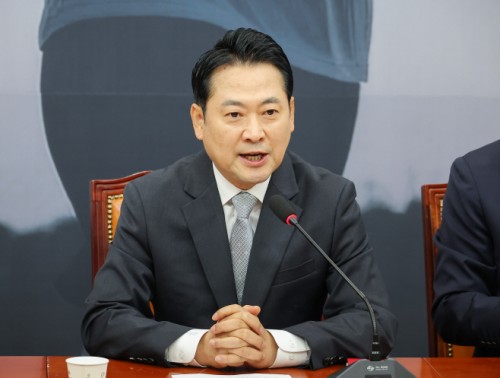 |
| Jang Dong-hyuk, leader of the People Power Party, speaks during a supreme council meeting at the National Assembly in Yeouido, Seoul, on September 18. / Source: Yonhap News |
People Power Party (PPP) leader Jang Dong-hyuk on September 18 accused the ruling camp of orchestrating pressure for Chief Justice Cho Hee-dae’s resignation, creating a “people’s tribunal,” and pushing politically motivated special prosecutions—calling them “a joint production of the presidential office and the ruling party.”
Presiding over a supreme council meeting at the National Assembly, Jang said, “In just four days we saw unprecedented, unconstitutional moves: a bill to set up a people’s tribunal, threats to force the chief justice to quit, crushing the opposition through fast-track trials, collusive political special counsels and court actions to jail opposition lawmakers, and a constitutional-amendment drive for long-term one-party rule.” He added, “The presidential office pokes from the side, the ruling party sets the tone, and the presidential office nods along—otherwise none of this could happen. The ultimate goal is clear: an ‘all-powerful one-party state’ where Lee Jae-myung rules indefinitely.”
Jang asserted that “a democracy built over 100 years is collapsing in 100 days,” and criticized Democratic Party (DP) leader Jung Chung-rae for “directing” probes: “Even now, the ruling party leader is instructing the special counsel to investigate the chief justice.”
His remark referred to Jung’s social-media post a day earlier: “With suspicions snowballing and Cho denying them, only a special-counsel probe can reveal the truth… The extraordinary election-law remand by Chief Justice Cho must be clarified. We will not let this slide. The fire of judicial reform has been lit; strike while the iron is hot.”
Jang went on, “It’s a textbook playbook: someone touts a tip, they wave around an untraceable recording, the president or prime minister feigns shock and says it’s ‘unthinkable.’ They whisper among themselves, the ‘Gaeddal’ swarm in, coordinates are posted, and once the public-opinion-driven investigation starts, the hunt is over. We must stop it—there’s no time left.”
On President Lee’s pledge to usher in the “KOSPI 5000 era,” Jang said it was “too early to be optimistic,” warning that the “stronger” Commercial Act and the Yellow Envelope Act would weigh on markets, while “live ordnance” remained in pending U.S.–Korea tariff talks. He also argued that government-reorganization plans to shake up financial oversight—and a new Financial Supervisory Commission bill—mirror failed models in the U.K. and Australia, risking fragmentation.
“KOSPI 5000 requires harmony with tax law, a balance between labor and management rights, and a stable, sound market,” he said. “The PPP will use carrots and sticks wisely to build a solid road, not a bubble road.”
Most Read
-
1
-
2
-
3
-
4
-
5
-
6
-
7





















